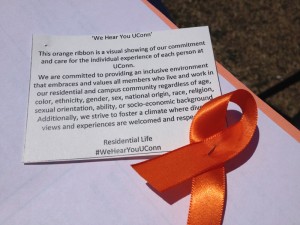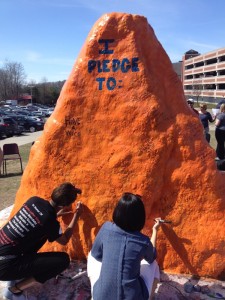[soundcloud id=’201467471′]
By Mairead Loschi
Professionals from Residential Life, RAs, and students gathered around the rock on Thursday to have an open dialogue about social issues facing the UConn campus. The Executive Director of Residential Life, Pamela Schipani, said that this demonstration was more than just a reaction to recent events, “it’s about a sense of community on campus.”
Schipani said the goal of the event was to bring the conversations between residential life and students into a more public setting, “to let people know that it’s absolutely okay to have discussions and to learn and to show vulnerabilities.”

Orange ribbons were distributed to symbolize a commitment to inclusion on the UConn campus. (Photo by Mairead Loschi)
The rock was painted a vibrant orange with the words “We Hear You UConn” painted in a bright, contrasting blue. On the other side of the rock students were encouraged to make a personal pledge and write on the rock in sharpie. Chairs were assembled around the rock, with every two chairs facing each other to facilitate one-on-one conversations. A box was placed at the base of the rock for students to share their ideas and suggestions. Orange ribbons were distributed to students, to demonstrate a commitment to inclusion on campus.
Students like Karina Barra, were optimistic about the larger, campus-wide impact of this event, “Maybe today something will open up in terms of having a conversation with others.”

Students signed the pledge and wrote words of support on the back of the rock. (Photo by Mairead Loschi)
Roberto Valentin said that the conversations he was having with students showed a mix of frustration and positive discussion. Valentin offered an explanation for the dissatisfaction, saying “students feel that there are a lot of conversations happening, a lot of awareness that is beginning to spread, but not a lot of action being taken. I think that’s where a lot of students get frustrated.”
Prekiya Kennebrew, a student majoring in psychology with a minor in women gender studies, shared some of her frustrations about the social environment on campus, saying “I think that it’s a lack of empathy on this campus. If it doesn’t directly affect you or your community then people don’t care.”
Other students, like Annabelle Orlando had productive and positive discussions with residential staff. Orlando said she had an interesting conversation, with her hall director, about “the student body and the administration’s awareness of issues of equality and discrimination on campus within the past year.”
There was a significant turnout as the event continued. Some professors brought their classes. And students just passing by, wandered in to the event to raise their concerns. David Ahearn, a PNB major, said he had been thinking about the social issues on campus and said he was touched by the sight of the bright orange rock. Ahearn voiced his thoughts about greater inclusion on the campus, “I think that people need to learn to accept themselves first and then just be happy that they have such diversity to look at, on campus especially. I think our campus is vibrant and beautiful and I don’t understand why anyone would want to hate anybody.”
Overall there was a great consensus that “We Hear You UConn” had started the conversation. Prekiya Kennebrew said that this event was an important first step in making our campus more inclusive and more safe, “I just think we need to all come together and understand that alt hough it’s not your group that’s being targeted it still matters and you still should be included in the conversation.”

Students were encouraged to share their suggestions and ideas with Residential Life. (Photo by Mairead Loschi)
So what comes next? Some students offered suggestions on how these conversations can be continued. Annabelle Orlando said she wanted “ a lot more events like this, where they listen to what the students are saying and ask for suggestions.”
Others focused on changing the mindset of the campus, “I think keeping open minds. The hardest part for people to start to understand one another is knowing that their lived experience is different from other people’s.” Still other students believe that change needs to come at an institutional and administrative level, “You should require classes that teach about these sort of topics. Students shouldn’t be graduating, not understanding what racism is. If a student’s going to understand calculus I don’t see why they shouldn’t be able to understand those kinds of fundamentals.”
Pamela Schipani, Executive Director of Residential Life, summed up the event in the context of the University environment, “There’s a lot going on at the institution. A lot of positive as well as some things that we’re not proud about and hopefully this will help to engage everybody in a dialogue that moves us all toward the positive and a strong sense of community.”

